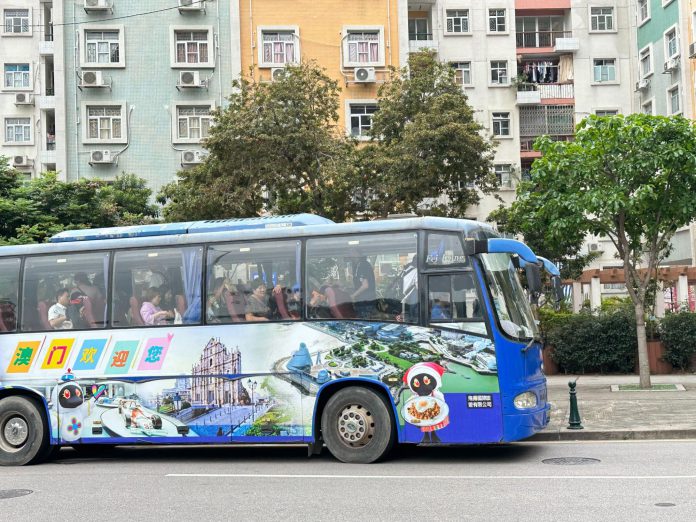Daily lives of Macau residents are upset as tourists return to the city.
By James Cheng
Ivy Cheung has to leave home ten minutes earlier to get on a bus for work, as tourists are back in Macau after the pandemic.
“Many tourists take my bus, because the bus route covers popular tourist destinations in Macau Island and Taipa. I used to spend around 20 minutes going to work, now I have to spend at least 30 minutes waiting for buses,” she says.
“Tourists not only visit popular tourist destinations now, but also places where locals go as they want to discover other sides of the city,” she adds.

Cheung points out that one of her favorite restaurants – U Veng Kei, an ordinary cha chaan teng situated in her neighborhood, is packed with tourists at busy times.
“Once, I went there with my family on a Friday night and saw a group of people waiting outside the restaurant. It is very annoying as I used to be able to walk straight in. Though one waiter told me that I just had to wait for a while, I went for other options since we were all starving at that time,” Cheung says.
“U Veng Kei is very popular among tourists since it offers a wide range of Portuguese cuisines such as minced meat with rice in a cha chaan teng manner. Price ranges from around MOP $50 (USD $6.2) to MOP $100 (USD $12.4), which is a very good deal,” she adds.
Another Macau resident Eva Cheang also finds tourists upsetting her daily routine.
“I only have one hour for lunch. Now I have to wait for at least 25 minutes before I can be seated. Sometimes I have to order takeaway instead of dining in.”
“My workplace is in the southeast area of Macau Island. It is a busy commercial and residential district where there are many different kinds of restaurants offering Japanese, Taiwanese, Korean and Thai and Macau cuisine. Also, there are some big casinos such as the Metro-Goldwyn-Mayer hotel (MGM Macau), which are popular among tourists,” she adds.

Cheang observes many young tourists want to visit unique places in Macau for taking photos even on busy traffic roads, which some are recommended by Xiao Hong Shu, a Chinese lifestyle platform many follow to find information about tourist attractions.
“I once saw a tourist walking on the road, San Ma Lo, the main avenue in the heart of Macau Peninsula, only to find the best angle to take photos of the Grand Lisboa Hotel. It is quite dangerous as it is a traffic road. They do not seem to be aware that cars are coming and going,” she adds.
Macau lawmaker Song Pek-kei says about one million tourists visited the city during the golden week from 29th April to 3rd May this year, according to the Public Security Police Force of Macau.
“The biggest difficulty of developing the tourism industry is to strike a balance between the economy and the well-being of the local community.”
Song thinks the government should have better planning to foster tourism while allowing citizens to live their normal life.
“The government should divert tourists to different parts of Macau to avoid overcrowding. Software and hardware facilities, capacity of the local community should be considered when trying to strike a balance between the needs of tourists and local residents so that the industry can be developed in a sustainable manner,” she says.
Edited by Fiona Dongye
Sub-edited by Charlie Chun







































